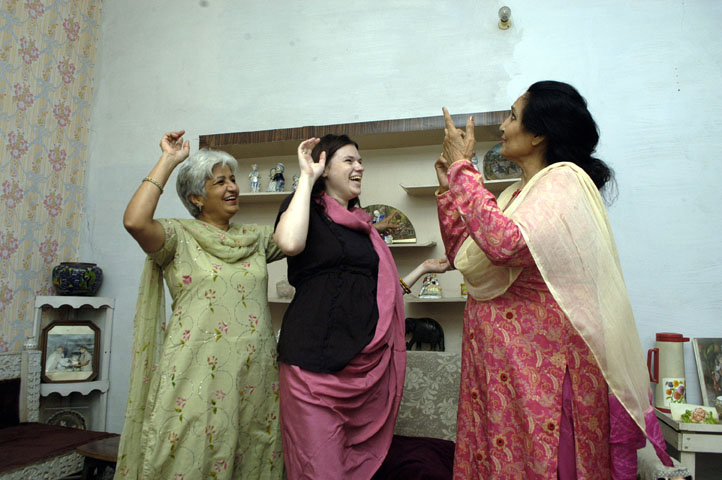 Turns out, Buaji was right.
Turns out, Buaji was right.Buaji is S's great aunt; she lives in Jaipur and takes care of her husband, who has Parkinson's disease. She is a vibrant woman, incredibly full of life, and no one ever fails to comment on the fact that it's a shame she's stuck in her somehwat-dilapidated house, comforting a man who can hardly move.
It makes me admire her more, in fact, because it would be so much easier to put him into a facility, to dash off every day, shopping with relatives and going to family events. To settle for a life of occasional visits, dying her hair black as soon as gray roots begin to emerge from her hairline, proudly showcasing photo albums from her years as a host for foreign exchange students, demonstrates a kind of love that isn't spontaneous but learned, and probably much stronger for being so.
We visited Buaji before my engagement, and she took us to all the shops she's always taken her visitors, shops where the normally brazen dukhandaars become timid as she harangues them for a 10-rupee discount. Before we left, she insisted on S chronicling our visit.
I had spent a few hours that day pouring over old albums, and couldn't help but notice the repetition: confused white girls, bedecked in heavy jewelry and glittering saris, arms thrown toward the ceiling in a pathetic bhangra. But I didn't want to ask, lest I draw attention to the somewhat strained faces of her charges.
I was wearing a black shirt, so Buaji insisted that S's mom give me her necklace; then, Buaji disappeared into her room and emerged -- in a fresh silk suit, though she had gotten dressed for the day less than an hour before -- victorious, a festive pink dupatta waving in her hand. We moved to her sitting room, a dark, dusty place showcasing treasures such as Hummel figurines and chipped plaster models of the Air India maharaja, closed except for the most important occasions, and she draped me in the dupatta, tucking one end into my jeans.
"Now you are having color, and you are looking pretty!" A diamond in the rough, I am.
After a few sober shots of us three women demurely smiling, as well as muddled self-timed shots with S half in the frame, we stood up and initiated the process of goodbyes. But just leaving would be too easy.
Buaji began speaking in Punjabi to S's mom, and began playfully wiggling her hips, then shrugged her shoulders; soon, her arms were raised exultorily in the air to an inaudible bhangra beat.
"When the foreign students see me dancing the bhangra, they are always looking at the ceiling and asking, 'What are you pointing at?'" she giggled. Her laughter was infectious, and as S's mother began grooving along with Buaji, the matron turned to S.
"You take our picture. Then you can look at this picture, and you will remember the dancing, and you will smile!" I chortled, halfheartedly pointed my fingers skyward, and humored her. At least I had an explanation, I thought.
But now, when I look at the picture, it's a funny thing -- I do smile. A rush of wonderful memories floods me, and I laugh. If I'm feeling blue, all I have to do is think about Buaji, and remember that some of the things that seem ludicrous are, in fact, the best parts of life. If there's anything I've learned in India, it's that simple things do matter, and pleasure doesn't have to be sophisticated; even if you're feeling miserable, the smallest something can reenergize your day.
Tags:
No comments:
Post a Comment